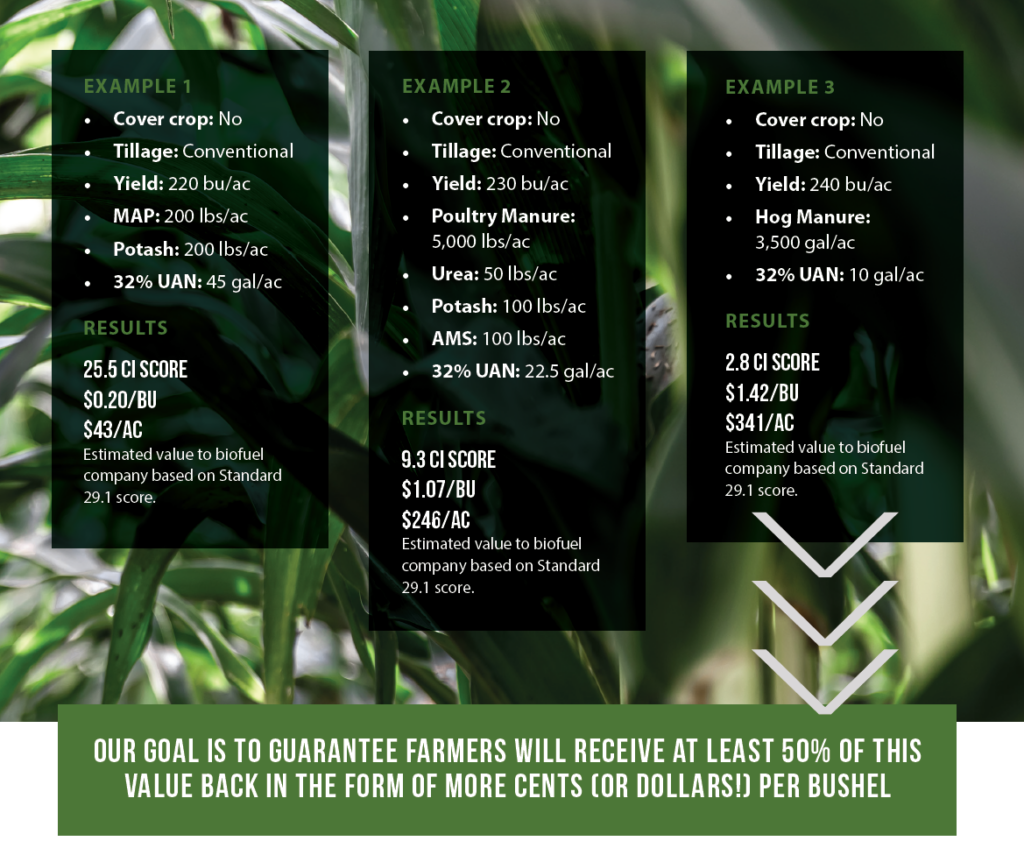What is one of the easiest ways for farmers to earn more money per bushel without changing any practices on their acres?
Certifying their farm’s Carbon Intensity (CI) score
Continuum Ag, an Iowa based agricultural consulting company specializing in soil health profitability, breaks CI scoring down for us:
Carbon Intensity is the production footprint assigned to a bushel of grain. The score itself is generated using the federally approved GREET model. Today, the estimated standard CI score for corn is 29.1g GHG/MJ of ethanol energy.
The lower the CI score, the more attractive that production is for end users. For example; the CI score of 0.0 means that the bushel is net carbon neutral.
The Inflation Reduction Act, Section 45z now assigns a direct value to a Carbon Intensity Score. This value is publicly available. The tax credit value to an ethanol plant is estimated to be $.054 cents per CI point below the industry estimated standard CI score of 29.1. For bushels that are carbon neutral, or 0.0, it is worth a $1.57/bu in form of a tax credit to the ethanol buyer.
Approval details are still being finalized by the IRS, however, it is anticipated that the majority of these premiums will be shared with producers. Ethanol facilities stand to profit for each sustainable farming practice that a grower incorporates, measures and verifies within their production. Growers carry a bulk of that risk, but could be rewarded with an estimated 50% of that credit in form of a premium payment.- Continuum Ag
LONG STORY SHORT
The government is issuing a tax credit to ethanol plants if they can match or beat a certain carbon intensity rating for renewable fuels.
The Department of Energy has issued a default carbon intensity score for the production of corn. This default score automatically applies to your farmland unless you get your ground certified with its own score from a third party certifier.
The default issued average CI score for corn production is 29.1. Simply jumping through the hoops of certifying your farm’s unique score (and not changing ANY management practices) has been shown to bring your land’s score down significantly.
Your score, even with standard farming practices, is often better than the default that is being assigned to your farm.
Bonus points if you have already implemented practices that lower your score even more.
Practices that will lower your CI score include reducing commercial fertilizer inputs, utilizing cover crops, applying manure, tillage practices, and your farm’s yield.
Let’s address some common questions:
- This is not another “carbon program”.
- If you’ve already incorporated sustainable practices you can still participate.
- There is no multi-year commitment or contracts.

WHEN SHOULD I THINK ABOUT JUMPING IN
Come 2025, ethanol plants will be required to abide by these scores. This means they will be in the market for buying certified CI grain this fall. With the 45Z tax credit being public knowledge, this sets farmers up to negotiate premiums for their lower CI score bushels as soon as later this year.
In our ongoing effort and promise to “Empower Farmers to Win”, Wells Ag Supply is partnering with Continuum Ag to negotiate these premiums on the farmer’s behalf with ethanol plants at the executive level. We want to guarantee that our growers will receive at least 50% of the tax credit value back in the form of more cents (or dollars!) per bushel.
HOW TO GET STARTED
Get in touch with your Wells Ag sales agronomist. We are prepared to make this as hands-off for you as you prefer. We can create your TopSoil.Ag farm profile to get your acres certified – we will just need to collect information from you such as field maps, application maps and receipts.
LEARN EVEN MORE
We recorded a webinar on this topic that we invite you to view. Access Grant Wells walking you through what this could look like for your farm.



